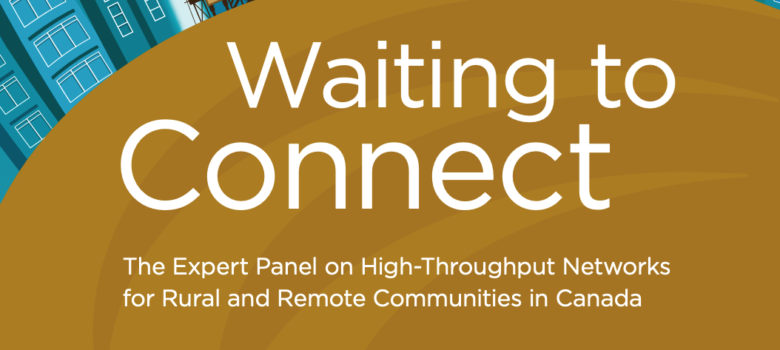Canada’s strategy to ensure that everyone from coast to coast to coast has access to affordable high speed Internet services is widely viewed as a failure and the source of ongoing frustration for many, particularly those in rural, remote and indigenous communities. Those communities often face the prospect of no broadband access or at best expensive, unreliable services. The Council of Canadian Academies recently convened an expert panel on High-Throughput Networks for Rural and Remote Communities in Canada.
The panel’s report is a must read for anyone concerned with equitable and affordable Internet access and the consequences of leaving many communities – particularly indigenous communities – behind. The panel was chaired by Karen Barnes, the former president of Yukon University and included Professor Catherine Middleton, the Director of the Ted Rogers School of Information Technology Management at Ryerson University. They join the Law Bytes podcast this week to discuss the panel, the report, and the recommendations for policy action.
The podcast can be downloaded here, accessed on YouTube, and is embedded below. Subscribe to the podcast via Apple Podcast, Google Play, Spotify or the RSS feed. Updates on the podcast on Twitter at @Lawbytespod.
Credits:
CBC News, Digital Divide May Impact the Future of Indigenous Youth










So, it’s actually, physically expensive to run cables over large distances to dispersed users. It takes real materials and real labor. Living out there makes it legitimately costly to give you service.
Nobody’s actually forced to live in a rural or remote area, and I’m not sure why anybody would think it was “equitable” for everybody else to have to subsidize somebody’s choice to do so.
Pingback: ● NEWS ● #MichaelGeist #Internet ☞ The Law Bytes Podcast, Episode 1… | Dr. Roy Schestowitz (罗伊)
Apparently you’ve never heard of a reserve
People live in “rural” or “remote” locations for many reasons, some of which are very important. They may live on reserves as Ben noted, which are their ancestral lands. They may be farmers making food. They may be military, first responders or land caretakers protecting our people, our land and our sovereignty.
Or they might be people who decided to get away from the parochial and self-obsessed attitudes of the so-called “elites” in the big cities.
All of these are important reasons that “force” people to live in remote areas where the Internet access that was PROMISED never materialized. Personally I think that clean water on reserves should come first, but that is clearly going to require a change in government.
People have important personal reasons to live in all kinds of places. “Ancestral land” is neither a better nor a worse reason than any of the other reasons it might be important to a person to live in one place or another.
Whatever your personal attachment to a place, it still doesn’t create an obligation for others to subsidize your choice to live there.
It’s also a free choice to take on a job or business. If nobody will take the job because some service is missing, then maybe you need to pay them enough either to cover whatever it actually costs to create that service, or to compensate them for going without it. It does NOT make sense to externalize a cost that could be internalized. The market has plenty of problems, but this is the sort of case where it works.
When you choose where to live, you choose a package. You shouldn’t then expect the rest of the world to pay to remake the place you chose.
As for the suggestion that everybody else should pay for your Internet access so that you can escape other people’s “parochial and self-obsessed attitudes”… that’s about the most parochial, self-obsessed thing I’ve ever seen. It makes about as much sense as me deciding to move to a city because I don’t like people’s attitudes in the country, and then asking you to plant trees for me because I don’t like all the pavement in the city.
And, hey, what if somebody’s moved to some remote place to get away from the Internet? I’ve considered it…
Another issue that has not yet been identified is security. It’s all well and good connecting up every Canadian, but we are currently seeing a cyberwar between Iran and Israel. See: https://www.nytimes.com/2021/11/27/world/middleeast/iran-israel-cyber-hack.html
Civilians are being heavily affected by those attacks: The same thing can happen here with our current tensions with authoritarian governments around the world.
I expect there will be a LOT of disruption in our Internet-connected technology if China invades Taiwan, with the CCP trying to keep the democracies from interfering. If we are going to face that future, our cybersecurity needs to be a LOT better.
If you’re going to build it “right” and build it “once” then make sure it’s secured, please. For all our sakes.
Psychiatric help is more vital today than it has ever been, in my opinion. It has been quite valuable to me, and I am confident that it will be similarly good to you. If I advise that you search up https://www.linkedin.com/company/calmerry and contact them, I hope I can be of assistance. In my perspective, there should be no problems or complications. For example, I contacted them and was quite satisfied with their service until they expressed no reservations.
Yes, access has to be paired with security in rolling out this high-speed internet service. I hope that is addressed as well.